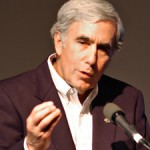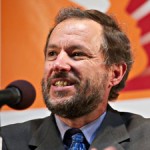Archive for the ‘Academia and science policies’ Category
TFF PressInfo: Sverige – inte längre aktör för en bättre värld
Av Jan Öberg
Dr.hc., direktör för TFF
4 maj 2014
Eliten i Sverige är mer lojal mot Nato, USA och EU än mot sitt folk
• Under de senaste 25-30 åren har Sveriges militära, säkerhets- och utrikespolitiska elit vridit Sveriges politik 180 grader.
• Dessa grundläggande förändringar inleddes av den socialdemokratiska regeringen under Göran Persson och utrikesminister Anna Lindh och har genomförts praktiskt taget utan offentlig debatt.
• Omsvängningen till interventionism, militarism och USA/Nato på alla områden har planerats gradvis, i smyg och ohederligt – kort sagt på ett sätt som är ovärdigt en demokrati.
• Denna elit är mer lojal mot Bryssel och Washington än mot svenskarna.
• Om din bild av Sverige är att det är ett progressivt, förnyande och fredsfrämjande land med global inställning som försvarar folkrätten så är den – tråkigt nog – föråldrad.
Hur Sverige har förändrats
Sverige är inte längre neutralt och det är bara formellt alliansfritt; det finns ingen mer närstående bundsförvant än USA/Nato. Landet har upphört att utveckla en egen politik och positionerar istället sig inom ramen för EU och Nato. Landet bidrar inte längre med betydelsefullt nytt tänkande – det sista var Olof Palmes kommission om gemensam säkerhet (1982). Read the rest of this entry »
University cooperation for equity and empathy
By Johan Galtung
China Three Gorges University, Yichang, 23 Apr 2014
A great honor to open the 11th university cooperation conference of N.E.W.S–North-East-West-South—founded in 1993 at the Freie Universität, Berlin by S.P. Park.
Classical university cooperation across borders has professors teaching in one country students from other countries. Thus, when Copenhagen ruled Denmark-Norway 1397-1814 Norwegians studied at the University of Copenhagen, founded in 1479. The University in Oslo came in 1811, but the asymmetry continued; some of it necessary and useful, but not ideal. Missing was equity, “I learn from you, you from me”; missing was empathy, “You learn about me, I about you”. The teaching country is superior in power, shaping the minds in the learning country. But the learning country learns about the deeper features of the teaching country, not vice versa.
A colonial relation. The colonialist leader, England – also in Scotland-Wales-Ireland – imports raw students for processing at huge fees, and exports English as patented commodity with no processing rights. Major industries both; but learning nothing about the world. Of course old knowledge must flow from those with more to those with less, even if professors often exaggerate their own importance: students may learn more together and by self-study–maybe 10%-40%-50%. But professors monopolize exams and diplomas, so better absorb well. Read the rest of this entry »
Nonviolent Geopolitics: Law, Politics, and 21st Century Security*
By Richard Falk
In this short essay, my attempt will be to articulate a conception of a world order premised on nonviolent geopolitics, as well as to consider some obstacles to its realization. By focusing on the interplay of “law” and “geopolitics” the intention is to consider the role played both by normative traditions of law and morality and the “geopolitical” orientation that continue to guide dominant political actors on the global stage.
Such an approach challenges the major premise of realism that security, leadership, stability, and influence in the 21st century continue to rest primarily on military power, or what is sometimes described as “hard power” capabilities. [1]
From such a perspective international law plays a marginal role, useful for challenging the behavior of adversaries, but not to be relied upon in calculating the national interest of one’s own country. As such, the principal contribution of international law, aside from its utility in facilitating cooperation in situations where national interests converge, is to provide rhetoric that rationalizes controversial foreign policy initiatives undertaken by one’s own country and to demonize comparable behavior by an enemy state. This discursive role is not to be minimized, but neither should it be confused with exerting norms of restraint in a consistent and fair manner.
My intention is to do three things:
• to show the degree to which the victors in World War II crafted via the UN Charter essentially a world order, which if behaviorally implemented, would have marginalized war, and encoded by indirection a system of nonviolent geopolitics; in other words, the constitutional and institutional foundations already exist, but inert form;
• to provide a critique of the realist paradigm that never relinquished its hold over the imagination of dominant political elites, and an approach has not acknowledged the obsolescence and dangers associated with the war system;
• and, finally, to consider some trends in international life that make it rational to work toward the embodiment of nonviolent geopolitics in practice and belief, as well as in the formalities of international law. Read the rest of this entry »
Peace Economics: Making Money Doesn’t Need to Hurt
By Jelena Mair
Business and Peace are not mutually exclusive. Business does play a crucial role in society. More so, business impacts and depends upon its surrounding. It impacts the
social well-being of people and planet, whether intentionally or unintentionally, both locally and globally through the chosen ways of operation and production.
Equally, does business play a key role in contributing to economic development, peace and stability in the areas where it operates. Business provides jobs and revenue to local markets; sets examples of sustainable business practices and can provide support for various social programs through strategic social investment.
In short, business is an inherent aspect of our society, and therefore, if we are striving for a more peaceful and sustainable world, for-profit private enterprises are the most crucial actors in achieving this goal. Read the rest of this entry »
Why do I persist?
By Richard Falk
I have been asked recently why do I persist in working hard for the things that I believe in, knowing that I will die in the next several years, and am almost certain not to be around for the catastrophic future that seems to cast its dark shadow across the road ahead, and can only be removed by a major transnational movement of the peoples of the world.
Similarly, why do I accept the defamation and related unpleasantness that accompanies my efforts to be a truthful witness of the sufferings endured by the Palestinian people in the course of their struggle for freedom and in violation of their fundamental rights? Some friends pointedly suggest ‘why don’t you just sit back, enjoy the pleasures of an easy life, and if still restless and alert enough, devote yourself to the narcissisms of producing a memoir?’
Or at least, why not at least indulge the self-exploratory pleasures of proving to myself that I am a decent poet or that I can still improve my chess or that, appearances to the contrary, I am still not too old to learn Turkish? At worst, I could continue to write barbed comments on the passing scene from the relative safety and comfort of the blogosphere, and to relieve the monotony of a virtual life, take occasional cruises to exotic destinations seeking out ‘ships of fools.’
Several prominent philosophers have attempted to answer such generic questions in a book recently published with the alluring title of Death and the Afterlife (Oxford University Press, 2013). It contains three lectures given by Samuel Scheffler, two at the Berkeley campus of the University of California and the third at the University of Utah, as well as a series of generally laudatory commentaries by four other distinguished philosophers and a response at the end by Scheffler.
The core argument developed by Scheffler is that human beings care more about the collective survival of humanity than they do about either their own personal immortality or even about the survival of those that they love and befriend, that is, those who are closest to us in our present life.
This rather novel line of inquiry investigates the implications of a thought experiment that supposes the extinction of the human species either due to ‘a doomsday scenario’ in which life on the planet is brought to an end or ‘an infertility scenario’ in which all women stop having the capacity to bear children. Read the rest of this entry »
Breaking free: Choosing a better human future
By Richard Falk
I have long believed that prospects for a hopeful human future depend on radical and visionary feelings, thought, and action. Such an outlook reflects my view that the major challenges of our time cannot be met by thinking within the box, or implementing the realist agenda of doing what it is feasible while disregarding what is necessary and desirable. For instance, with respect to climate change such a conventional approach avoids asking what needs to be done to give future generations positive life prospects, but seeks, at best, to do what seems politically feasible at the moment, that is, far too little.
This means not putting a cap on energy or water use, not limiting carbon emissions or prohibiting fracking, continuing to encourage economic growth, and refusing to question consumerism. In effect, this conventional approach does not meet challenges, but at most seeks to defer and mitigate harmful effects to the extent possible. In effect, it opts for a worse human future, and remains in bondage to the deformities wrought by clearly deficient neoliberal prescriptions for human fulfillment.
Against this background, it was a personal breakthrough to meet Jeff Wilson who is, Read the rest of this entry »
IPRA – International Peace Research Association – at 50
By Johan Galtung
Known as IPRA, founded in 1964 in London–and this author, 34 at the time, is the only surviving founder. IPRA rotates every two years from one peace research center to the other, and is now in very competent Turkish hands. And what is more natural than having the 50th anniversary for the hub of peace studies in that hub of the world, Istanbul, 10-14 August this year!! Hurry up, register!!!
Today it is hard to believe, but to get IPRA started was as problematic as to launch peace studies in general.
The Western establishments did not like “peace”; their favorite was security, absence of violence against themselves in particular and their elites even more particularly. Security studies became academically institutionalized Western paranoia.
And the peace movement establishments did not like “studies”–what was there to study? Each one knew the one correct answer! Read the rest of this entry »
TFF PressInfo: Institute a course for all on what confront humanity in the 21st century
Open Letter to College and University Presidents Re: Global Security 101
By David Krieger
You are in a unique position of leadership to influence today’s youth to achieve a better tomorrow for America and the world. I am writing to enlist your help in educating young people to understand the survival challenges that face humanity in the 21st century.
Education is driven by values. Young people must learn to live with reverence for life, as did Albert Schweitzer, and to support equitable and nonviolent solutions to social problems, as did Gandhi and Martin Luther King, Jr. Young people must be imbued with compassion, commitment and courage. They must learn to use their imaginations to find creative and cooperative solutions to the great issues of our time. And they must find joy in the process and take time to celebrate the miracle of living on the only planet we know of in the universe that supports life. Continue here…
How the state Assembly tries to limit what I can teach
By Stephen Zunes
In preparing my syllabus for my introductory course on the Middle East this semester, it gives me pause that the California Assembly is still on record declaring that discussing certain well-documented historic incidents in modern Middle Eastern history should “not be tolerated in the classroom.” This unprecedented attack on academic freedom came in the form of a resolution (HR 35), co-sponsored by 66 of the 88 Assembly members, which passed by a voice vote in 2012. Continue reading here….
The resolution purports to be in opposition to anti-Semitic activities on university campuses, yet defines “anti-Semitism” so broadly as to include student activism targeting certain policies of Israel’s right-wing government as well as professors and others who acknowledge certain well-documented war crimes committed by Israeli forces.
Clashing views of political reality: Chomsky versus Dershowitz
By Richard Falk
My friend and former collaborator, Howard Friel, has written an intriguing book contrasting the worldviews and polemical styles of two Jewish American intellectuals with world class reputations, Noam Chomsky and Alan Dershowitz (Friel, Chomsky and Dershowitz: On Endless War and the End of Civil Liberties, Olive Branch Press, 2014). The book is much more than a comparison of two influential voices, one critical the other apologetic, with respect to the Israel/Palestine struggle and the subordination of private liberties to the purveyors of state-led security at home and abroad. Friel convincingly favors Chomsky’s approach both with respect to the substance of their fundamental disagreements and in relation to sharply contrasting styles of argument.
Chomsky is depicted, accurately I believe, as someone consistently dedicated to evidenced based reasoning reinforced by an abiding respect for the relevance and authority of international law and morality. Chomsky has also been a tireless opponent of American imperialism and military intervention, and of oppressive regimes anywhere on the planet. He is also shown by Friel to be strongly supportive of endowing individuals whether citizens or not with maximal freedom from interference by the state. From such perspectives, the behavior of Israel and the United States are assessed by Chomsky to be betrayals of humane values and of the virtues of a constitutional democracy.
In contrast, Dershowitz is presented, again accurately and on the basis of abundant documentation, as a dirty fighter with a readiness to twist the truth to serve his Zionist predilections, which include support for the post-9/11 drift toward authoritarian governance, and an outrageous willingness to play the anti-Semitic card even against someone of Chomsky’s extraordinary academic achievements in the field of linguistics and of global stature as the world’s leading public intellectual, who has an impeccable lifelong record of moral courage and fidelity to the truth. Dershowitz has devoted his destructive energies to derailing tenure appointments for critics of Israel and for using his leverage to badger publishers to refrain from taking on books, however meritorious, if they present either himself or Israel in what he views to be a negative light.
Friel illustrates the contrast Read the rest of this entry »





